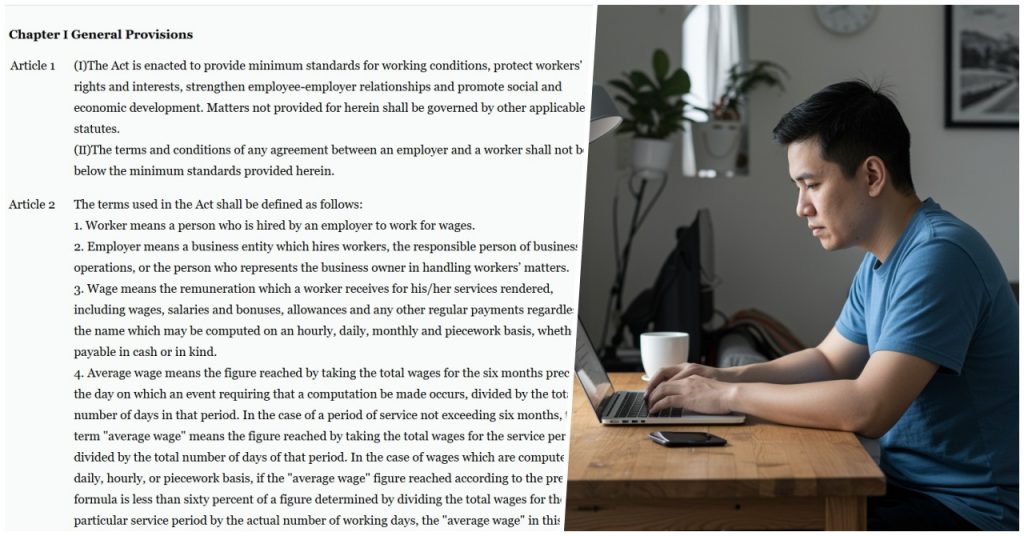Working abroad isn’t just about earning—it’s about knowing your rights and protecting your dignity. For Overseas Filipino Workers (OFWs) in Taiwan, the Labor Standards Act (LSA) plays a key role in ensuring fair treatment, legal protections, and safe working conditions.
Whether you’re in manufacturing, caregiving, or construction, this law outlines what you’re entitled to—and what’s expected of you. Here’s what every OFW should know.

What Is the Taiwan Labor Standards Act?
Taiwan’s Labor Standards Act (LSA) sets the baseline for employment rights in the country. It covers rules on working hours, wages, rest periods, leave, termination, and more.
While the law mainly applies to workers in industries like factories, construction, and service, some domestic workers and caregivers may follow separate regulations, depending on their contract type.
Labor_Standards_Act_2024-engYour Rights Under Taiwan Labor Law
These are the core protections the LSA offers to most OFWs:
Fair Wages
Taiwan enforces a minimum wage, currently set at:
- NT$26,400 per month
- NT$175 per hour
Wages must be paid on time. Payslips are required, and unauthorized deductions are not allowed.
Working Hours & Overtime Pay
- Standard hours: 8 hours/day, 40 hours/week
- Overtime pay:
- 1.33x pay for the first 2 overtime hours
- 1.66x pay for additional hours
- Max overtime: 46 hours/month (unless approved otherwise)
- Rest: At least one full day off every 7 days
Leave Entitlements
You’re eligible for:
- Annual leave (after working 1 year)
- Sick leave
- Maternity leave and related protections
Safe Working Conditions
Your employer must ensure a workplace that is:
- Safe and hazard-free
- Free from discrimination and harassment
- Compliant with occupational safety laws
Protection from Unfair Dismissal
Employers cannot fire workers without proper cause.
- Dismissals must follow legal procedures
- You have the right to challenge unfair termination
Legal Assistance and Complaints
If you need help, you can contact:
- 1955 Hotline (free, multilingual, 24/7)
- Ministry of Labor, Taiwan
- Philippine Overseas Labor Office (POLO)
- Migrant Workers Office (MECO), Taipei
Your Responsibilities as an OFW
Rights come with responsibilities. Here’s what the LSA and related policies expect from you:
Compliance with Work Contracts
- Follow your contract terms
- Show up on time and complete your duties
Respect for Local Laws
- Abide by Taiwanese rules and cultural expectations
- Avoid legal violations that could affect your stay or job
Professional Conduct
- Be respectful at work
- Follow your employer’s rules and company policies
- Avoid actions that could be seen as misconduct
Timely Documentation Renewal
- Alien Resident Certificate (ARC) and work permits must be valid
- Update documents before expiration to avoid penalties
Domestic Workers and Caregivers: A Special Case

If you’re a live-in caregiver or domestic helper, you may not fall under the standard LSA coverage. Instead, your rights are outlined in special labor arrangements supervised by Taiwan’s Ministry of Labor and monitored by MWO and MECO.
Still, you’re protected under basic human rights and entitled to a safe, dignified working environment. Report abuse or mistreatment to the 1955 Hotline or MECO immediately.
Where to Get Help
If your rights are violated or you need advice:
- 1955 Hotline: Free, confidential, multilingual help anytime
- Migrant Workers Office (MECO-Taipei): Offers legal aid and emergency assistance
- Local Labor Affairs Bureau: Handles wage disputes, contract issues, and workplace violations
- POLO-Taiwan: Assists with contract verification and worker support
Keep records of your contract, payslips, and any important communication.
Video: Understanding Taiwan Employment Law – More Than the Labor Standards Act
Taiwan’s Labor Standards Act stands as the foundation of the country’s employment law, but it does not cover every aspect of labor regulations.
Other areas shape workplace conditions, including social security, occupational safety and health, equity and anti-discrimination, as well as intellectual property and trade secrets.
Each of these protects workers’ rights, strengthens fair labor practices, and keeps businesses running smoothly.
A complete understanding of Taiwan’s employment law means looking beyond the basics and recognizing the broader framework that governs the workforce. This might seem intimidating at first but as a foreign worker, having this in your arsenal, could mean avoiding unnecessary troubles and difficulty at work abroad.
Frequently Asked Questions
Q: Are all OFWs covered by the Labor Standards Act?
A: No. Factory and skilled workers are covered. Caregivers and domestic workers follow special labor guidelines.
Q: What is the current minimum wage in Taiwan?
A: NT$26,400 per month or NT$175 per hour.
Q: Can I be fired without warning?
A: No. Employers must follow legal procedures and provide just cause.
Q: Where can I report abuse or non-payment of wages?
A: Contact the 1955 Hotline, MECO-Taipei, or the Labor Affairs Bureau.
Conclusion
You don’t have to be a legal expert—but you do need to know what’s fair. Understanding your rights isn’t just about reading laws. It’s about knowing what a healthy, respectful workplace looks like and having the confidence to speak up when something feels off.
Before signing any contract, ask questions—even the ones that seem small. What are your working hours? Is overtime paid properly? What happens if you get sick or need to go home? Clear answers now can prevent big problems later.
Keep your documents updated—like your ARC, work permit, and health card. These aren’t just papers; they’re your legal lifeline in Taiwan. Missing renewals or losing key documents can put your job and residency at risk.
And most importantly, don’t stay silent. If something feels unfair—low pay, poor conditions, abuse—you are not alone. Help is available, and your voice matters. Taiwan’s labor system has protections in place, and both the Taiwanese and Philippine governments have support offices ready to assist OFWs like you.
